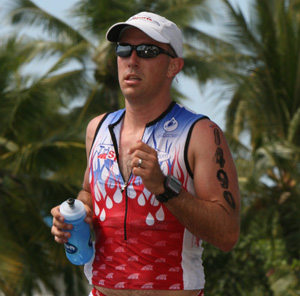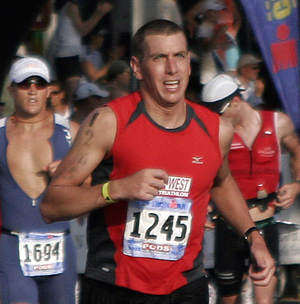Industry athlete Cid Cardoso Jr
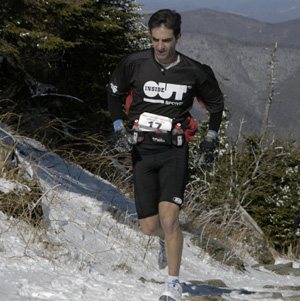
Cid Cardoso Jr is the owner, founder and president of Inside Out Sports and in addition to raising a family has raced over 20 Ironman races to date. The Brazilian born North Carolina resident is also a fantastic trail runner.
ST: Cid, how do you juggle racing and standing around in the expo before the race?
Cid: It is not easy. There is the physical part to deal with and there is the mental part to deal with. Sometimes at event expos I end up standing for quite sometime talking to customers, doing bike fits, etc, and that can obviously be very tiring. I try to come to the events that I will race a little more tapered, taking into consideration that the two days before the race may not be as conducive to resting as I would like. I used to also look for a chair as much as possible but I kind of gave up on that. The work I do at expos is not the sit down type. Consequently, I now no longer worry about it. I try to go for an easy spin or a quick swim at the end of the day to loosen the legs ups a little. After years of event expos though, we have now assembled a good crew so occasionally I can focus a little more on racing while others do the more physical part. However, probably the hardest part to deal with is the mental stress part. No matter how physically removed I get, I am always worrying about sales, getting calls about minor and sometimes major operational problems, having meetings with event directors, vendors and other sponsors. All those responsibilities and distractions are mentally taxing. I guess in a way that keeps my mind of the race until I’m in the water waiting for the gun to go off.
ST: Can you describe the race result you cherish the most?
Cid: I would say there are a few of them in the recent years:
The Inaugural Umstead Trail Marathon in 2004, where I won the race in 3:03 in a tough course, two weeks after the Mt. Mitchell 40 Miler.
The White Lake Sprint Triathlon in 2006, the NC race that qualified for the Best in the US Triathlon, where I beat a very competitive field with several of short course guys much younger than me to finish first and get the male NC slot.
Most recently I liked the 2008 Ironman Coeur D’Alene. The new bike course was tough, but I still managed a good run. I ran the first half of the marathon in sub 1:40 and for a while I though I could go 3:20 for the marathon. Then at mile 15 I started bonking and it took me three miles or so to get my stride and energy back. I ended up running the marathon in 3:28, which was still good for me. This was not my fastest Ironman but it was very rewarding because I was able to race the entire race and run as fast as I’ve run 10 years earlier. I’ve been racing triathlons hard for a long time without really any major breaks or injuries (I had foot surgery last year but was back doing Ironman 8 months later). Even though I’m not that old yet, I sometimes feel that I have a gazillion miles in my legs and it’s nice to break away from solid races to great races once in a while.
ST: What do you do to recover from an Ironman race?
Cid: I take a week off and spend more time splashing around the pool with my kids. I remember getting back into training after a couple of days following good Ironman race and not feeling so bad. I could actually ride pretty hard and do some good swim workouts much earlier than expected. However, I also remember crashing pretty hard a few weeks later. I started suffering from perma(nent)-tired legs and was fatigued all the time. I finally had to break down and take a few days off and “really” recover. I think that if you are fit, you can feel good after a day or two of rest, but you are only recovered on the surface. As a result, it comes down to taking some time off immediately after a race and slowly building the training back up or getting back to training right away and possibly screwing up a couple of weeks before “having” to take a more days off later on.
I also do sincerely believe in some of the compression pieces of apparel that are in the market now in helping with muscle recover. Using compression socks or tights for even brief periods of time following an Ironman race noticeably reduce muscle pain and fatigue on my quads and calves. Maybe it’s psychological but they seem to make my legs fresher for when I work out again.
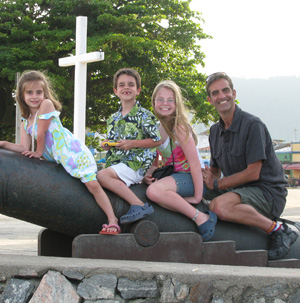
ST: Can you tell us about your athletic background?
Cid: I swam and played a lot of soccer as a kid. I started doing triathlons pretty young though, at the age of 16. Back then, in 1985 in Brazil there were not many sprint races so my first race was an Olympic distance one. I did a half Ironman a year later and by then I was hooked. I then came to college in the US (University of Virginia) where I continued to race in Triathlon and did a lot of bike racing, USCF and Collegiate. In 1990 I did my first Ironman (Hawaii), at the age of 21.
ST: I believe your mom and dad have also raced Iron distance events. Is that true?
Cid: Yes, they have. The have both done 4 Ironmans and they started doing triathlons at the age of 50. In fact, they didn’t learn how to swim until then so I’m pretty proud of them. They did their first Ironman when they were 59 and they are 65 now. Sometimes I think that my mom is even more committed to training and racing then I am and last year at IM Louisville she even had a chance to get a Kona slot (she passed). After retiring from IBM my dad became my partner in the business so now we work together. This year they are both training for the Chicago Marathon in November.
ST: What is your fastest stand-alone marathon time and where did you run it?
Cid: I remember running a 3:00:23 at the Shamrock Marathon a few years back. I really don’t run that many stand-alone marathons, since the triathlon season is so long now in North Carolina and in the off season I focus on my other passion, which is trail (off road) running. Plus now, with three kids, there are lots of activities on the weekends so I try to keep the off season somewhat free of races. I coach my 10 year old daughter’s soccer team and my 6 year old son’s as well, so I just don’t as much as I used to. I guess also with so many good races throughout the year and triathlons still being my focus, running a fast marathon has just taken a back seat. I keep thinking that some fall or spring I will focus on a marathon and try to run a fast time but it hasn’t happened yet. Maybe I should make that a priority soon and go for it before I get too much older and my times start getting slower. I’ve also run several off road marathons in the 3:02 – 3:06 range.
ST: What does a typical training week look like for you?
Cid: My training philosophy can sometimes be summed up as “train as much as you can when you can, since you don’t know when you will be able to train again”. My wife gets kind of mad when I say that but with my busy hectic life, not set work hours, it seems to work OK. I don’t think a coach would subscribe to this approach but I just don’t get to plan my weeks as neatly as I would like. As a result, I make the most of the time I have, even if it means pilling up mileage one day and then not training as much the next.
Overall, I try to swim three times per week, run three times a week, ride four times a week (two or so being on the trainer) and lift (weights) twice a week. I’ve neglected my swim for a while so now I’m trying to get faster again by swimming with a group at least one day. I ride the trainer two or three times per week before the kids get up at 5:30 am and try to get out on the road twice per week, for a hard ride with a group one day and for a long ride the other. I normally do a track work out and a tempo run with a couple of other training partners and then a long run whenever I can. Lifting is done whenever I can get to the gym for an hour or so. Occasionally I hop on the trainer at 10 pm and then drink a glass of wine at 11:30 so I can fall asleep. I do not plan a rest day since that is the day that life (work, family, etc) get in the way I don’t get to work out. This doesn’t leave much free time but it keeps me fit enough to race at the level that I want to race.
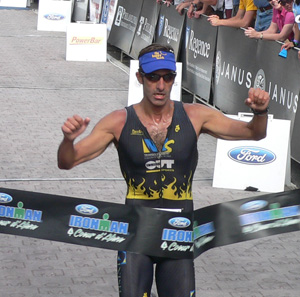
ST: What are you doing in terms of activities in the off-season?
Cid: Mostly trail running, lifting and riding my cyclocross bike. We got great trails here in the Raleigh area and with the winters being cool but not terribly cold, it is a great time to run and ride off road. My cross bike is one of my least expensive bikes since I pieced together from spare, used parts but it’s one of the most fun bikes I’ve ever owned. Like I said before, maybe one of these years I will focus on a road Marathon. On the other hand, maybe I will get back into playing soccer, and will play an adult league for a couple of months out of the year.
ST: Can you tell us what you have on schedule for the 2008 season?
Cid: I did a couple of local races including a Half Ironman in May and did Escape from Alcatraz in early June. I just did IM Coeur D’Alene this past weekend and had a good race and got a Kona slot, so now I will be training for Hawaii. I will do a few local races in NC between now and then including one more Half Ironman in September but with my kids’ soccer season starting at the end of August and games on weekends I suspect I will not be racing all that much.
ST: What is your favorite race event anywhere and why?
Cid: Probably the Mt. Mitchell Challenge, which is a 40 mile trail run from the Town of Black Mountain to the top of Mt Mitchell and back (20 miles mostly up and 20 miles mostly down, 95% on trails). Mt. Mitchell is the tallest peak east of the Mississippi River at 6684 ft and the run goes to the very top and then back down. It is held in February so there can be some ice and snow on the trails and the scenery is absolutely breathtaking. The tough terrain and all the climbing kind of suit a runner who runs more on leg strength than speed, like me so I keep gong back. I’ve finished 2nd three times but it’s getting harder and harder to place in the top five. Maybe one year I will get lucky.
Hawaii is also pretty special. After 6 trips to Kona I still haven’t had enough. Kona is a great environment and the race is so hard that it’s almost impossible to have a perfect day. Consequently, there is always room for improvement and there is always the hope that next time will be that allusive perfect day. I’ve never had a terrible day in Kona but again, I’m still waiting for the great one.
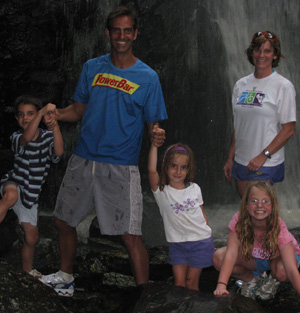
ST: What is your favorite food?
Cid: I don’t know about food but my favorite drinks are definitely coffee and red wine. I love strong Brazilian coffee. In fact, my dad and I have an espresso machine in our office and it gets used quite a bit. As far as red wine, I like Pinot Noirs, Zinfandels, Petite Shiraz, and some Spanish wines. As far as food, I would have to go with “bread”. It sounds simple and boring but I love French bread, sourdough bread, oatmeal bread, you name it. In fact, my kids give me a hard time because they say that I eat bread everyday for breakfast, while I make them pancakes, scrambled eggs, omelets and other more exciting things.
ST: Do you have any preferences in terms of music?
Cid: I went to high school and college in the 80s so I still like some old 80s music, like The Police and Men at Work. I also like Bruce Springsteen (old and new stuff as well) some less well known bands, like a band from NC called the Connells.
ST: Do you have any special tips for other age group athletes?
Cid: Train hard and set high but also don’t take yourself too seriously and find some other things you care about in life other than triathlons. Enjoy this great sport without forgetting the reasons why you got involved in it. It is easy to get caught up on the local competition and to get getting frustrated with results but at the end of the day I think most of us really like the way we feel when we race and train and the people we hang out with as a result of the sport. Probably some of my closest friends I have met through triathlons and training. In fact, I met my wife when I joined a masters’ swim team upon moving to Raleigh, NC after college (she was the swim coach!) I like the fact that in my world, business meetings are generally scheduled taking into consideration work out time (like the FIST seminars when I got the chance to kick Dan’s butt running uphill at 6:30 pace on the Devil Punchbowl’s loop the way he likes, with no warm up. Yes, that was a few years back but I’m ready to do it again …although Dan is probably 10 years older than me it’s still fun). Anyway, back to the question: balance in life is important if one seeks longevity in the sport and in relationships, and readjusting expectations (to be somewhat realistic with various other life commitments) can also help one positive. I’ve had to do that as my live has changed. I’m not much slower than 15 years ago but I don’t train as long, race as often, and worry about it as much. I’m still committed and competitive and a good attitude helps me to continue to enjoy triathlons just as much.
ST: Where do you think you’ll be in 5 years?
Cid: Hopefully running and riding with my kids, coaching soccer, still getting killed by my wife in the pool, doing some cool trail runs and finishing the occasional Ironman. I hope to be working a little less but be just as involved in the sport and in the business. It is a tough business to be in but there are a lot worse things I could be doing. I work with great people and I deal with motivated and fun (although demanding) customers.
ST: Is there anything else we should know about you?
Cid: I’ve been married to my lovely wife Kathleen for 12 years and I have three great kids, Alexa 10, Scott 6 and Monica 5. After all these years of racing, you can see that she has been incredibly supportive and understanding. She does occasionally tell me that I’m getting too obsessive about training or work and so then I adjust my balance back to a healthier state.


